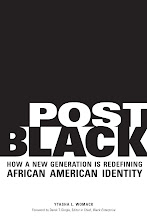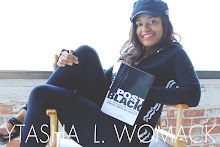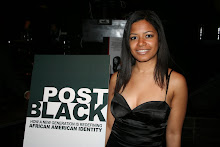Rob Fields is music ambassador and creator of BoldasLove.us, a website devoted to the new wave of underground black rock artists.
YLW: Why do you believe there is a new wave of black rock bands?
RF: I just think that what we are beginning to see is that people, particularly black folks are reaching beyond the narrow bounds of black life that we had been relegated to in greater numbers than before. You always had people in the fringe, people who were into rock or punk. But one of the beautiful things about technology is that it has allowed people of like minded interests to find one another. There are a lot of people out here who are into punk or rock and aren't into the paradigm of commercial hip hop or the r & b lover kind of thing. There is so much more to life than that.
YLW: The flourishing black rock scene is a cultural statement?
RF: It's a really exciting time. Black rock isn't about black kids picking up guitars, but rather an invitation to be brave and to question what we do, how we express ourselves and what we think of as traditionally black. Those are important things to look at if we are going to be citizens of the world. We have to be open to ideas, new people, and embrace diverse influences. It puts us in touch with our humanity. That is what black rock offers.
YLW: Is the rise of black rock also a way of challenging hip hop as the primary expression of black youth culture?
RF: Black folks aren't all thinking about the hip hop paradigm in terms of the way it presents masculinity or the way it presents black authenticity. There are a whole lot of black identities out there. We've always known that. We've never been this monolith. We have more ideas about what black is and you are broadening that definition with the Post Black concept at a time when we need. it. The world has gone global and we're still trying to rep our hood and our block. That's not even the game anymore.
YLW: The nerd culture is also cool today. There are even black nerd t-shirts. What are your thoughts on this?
RF: It's cool to be a nerd now. When I was growing up it wasn't . You had to be hard and street. As a nerdy kid, I didn't walk down the street and have girls throw themselves at me. I didn't know that.
YLW: How did you become a rock fan?
RF: I wrote about it in my piece My Life in Black Rock. I've never been so much into punk rock. When I was in junior high school, I got tired of the repetition on black radio and I started listening to top 40 which coincided with me going to prep school. When I got to college I was introduced to jazz and world music. Later, I was trying to get into the music industry and someone suggested that I should follow the Black Rock Coalition, which led to my first PR (public relations) gig. It lead me to black artists who were embracing diverse influences in their life. They sang about their humanity in a way I hadn't heard on commercial radio. I met the Family Stand, I met Living Color. I found a community of people who were into a diverse sound of black music and I felt, well how come more black people aren't into it.
YLW: Stylistically, what kind of rock do you like?
RF: I tend toward traditional song structure. Anyone doing very punky kind of stuff, angst and screaming into the mike, I don't really get it. I wasn't an agnsty kind of teen.
YLW: Why did you create BoldAsLove.com
RF: I started it 3 years ago. I felt a cultural shift happening. With black rock, black people were exploring the musical spectrum. (Black rock) was moving off the fringes. It's in the mainstream. You have Passing Strange on Broadway, Farai Chideya did a novel called Kiss the Sky about a black woman who has a rock band. Artists like Janelle Monet and others aren't fitting neatly into what's black. It's happening in London, too. President Obama is the example of what you're talking about with Post Black. We can't be Post Black until people stop being racist, but Obama is a sense of this larger world. It 's happening in music, in art. It's all this post blackness. I interviewed an African American artist recently and she said her favorite artist was Led Zepplin. Back in the day you would never say that.
YLW: There was a resurgence of black rock artists like Living Color and Fishbone in the late 80s. Then it faded away. What happened?
RF: There was such a big push for Living Color. They came out in 88'. That was 22 years ago which is a head blower in itself. After they hit, there was a lot of excitement, but there was also a lot of excitement about the black film movement with film like “Do the Right Thing.” A lot of black rock bands got signed. There was a lot of hope, but most were never able to recreate Living Color's success.
By the early 90s, you had the advent of gangster rap and hip hop went global, so everyone wanted to be down with this hip hop thing. Also, in the 90s, dancehall reggae got big. You had Shabba Ranks and Patra. However, the diversity of the music was around hip hop. Rock was met with this dismissivness. At the same time you had Arrested Development, PM Dawn, a lot of different sounds. But when hip hop went global in the 90s no one could think of anything in the black music departments but hip hop and R&B. There was no real room in the music industry for black rock bands.
YLW: What to you credit the current resurgence too?
RF: In the early parts of the 21st century, technology enabled people to meet audiences.
Back in the day, it was a big deal to have a fax machine. It was a different world. You needed a corporation to get radio airplay because there was no way to get heard. Black radio was not hospitable to anything that did not fall into a certain mode. Costs of recording started to come down. But then you did not have the Internet or the technology for things we take for granted today. Back then you couldn't, get a link to download an album or put your music on a Myspace page. In the 90s you had to go home to check your AOL account. Without the corporate support at that point, it was hard to get music out.
RF: Then you get this cultural shift, coming to the end of the Bush years, where people were just disillusioned with traditional power structures. There was also a large group of people who were looking for music that offered more substance. If I see another video with an expensive car and lots of jewelry. . . I also think the thing that hit the nail on the head was the Don Imus blow up. Black women said enough is enough with this hip hop thing. That was spring of 07. It's not that they wanted to get rid of hip hop, they just wanted more from it. There have always been creative and insightful and thoughtful people working in hip hop. We just need to support them now because the radio waves and video are full of lowest common denominator stuff.
YLW: There are a lot of black rock bands headed by women. What do you attribute this too?
RF: Hip hop started ignoring women. That's one thing about black rock, there are a lot of women out there leading bands. You have a healthy scene and community where you have both male and female representation. Hip hop would be a lot better if there were answer records. There used to be this back and forth. But now, women in hop hop are relegated to the underground. They're not on radio.
RF: I'm doing a survey and I asked people what genres of music are they listening to. Hip hop and R&B have taken the largest dip. More black people are listening to classical, world music, jazz, also afro punk.
YLW: How prolific is the scene?
RF: You can't throw a rock in Brooklyn and not hit a black rock band. There is this absence of coverage of black rock bands, though. Unless you're really big on cultivated this white following, you don't get coverage.
YLW: Which black rock bands do you like?
RF: I have a really wide list. I'm excited about the new Living Color album that came out in September. It's amazing. Kyp Malone's album Rain Machine is great. There is a band out of South Africa called BLK JKS. They are 4 men out of Durbin. They have a record that's beautiful and emotional. It's rock seen through an African prism, so you have the African rhythms, but it's a rock album. Res's new album Black Girls Rock is very good. Melvin Gibbs, the bass player for Elevated Entity mined the connection between Brooklyn and Brazil.
Tamar-Kali, will release her album called Black Bottom. She just has this powerful voice that is incredible. There's another band called Game Rebellion. They are a hip hop punk rock quartet. They are a great bridge between the hip hop world and the rock world. They write songs that deal with the complications of life. The Smyrk is real talented. The lead singer Doron Flake is what John Legend would sound like if he had the balls to do a rock record. There are a couple of other bands Shelly Nicole's Blakbush, California King. The Bots are these two kids who are 14 and 16. They have this rock, punk, ska sound.
For more information on Rob Fields go to http://www.boldaslove.us/.




Nice
ReplyDeleteI think it's horribly racist when some people try to say that certain music genres are only for "whites". I mean, white people sing reggae roots and hip hop, so why can't we simply play in a rock band without being seen strangely?
ReplyDeleteGrreat reading your blog post
ReplyDelete